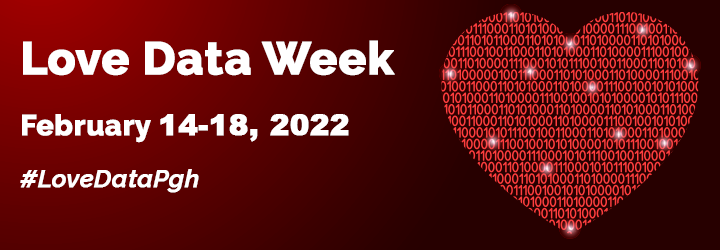Love Data Week helps Pitt students explore academia with data
The banner for Love Data Week.
February 16, 2022
From time traveling to 16th century witchcraft to jamming to a live concert in the Hillman Library, Love Data Week will help Pitt students explore data in a variety of formats this week.
Love Data Week is a series of 16 events and lectures celebrated at Pitt this week from Monday to Friday, with a range of presentations on topics ranging from biomedical science to analyzing 16th century witch trials. Students can register for events online. Universities worldwide have similar festivities.
Briana Wipf, a Ph.D. candidate in the English department, gave a talk examining data from the 16th century on Monday in the Hillman Library. She discussed the change in language that was used to portray the devil in witch trials and murder cases.
“We were interested in how the role of the devil changes, particularly in the witchcraft pamphlets. As he begins to appear he’ll be in the form of a cat or a dog or a frog, who’s helping the witch,” Wipf said. “And then as time goes on, he actually sort of makes an appearance as in a fully embodied human man.”
Wipf said one benefit of these talks is ensuring data accuracy when examining sources.
“It is important to be careful and deliberate about the data you select and acquire. You have to sort of take care of your data and curate it,” Wipf said. “You have to make sure it is accessible to you as the researcher, but also get it into a form that other people can hopefully use.”
Edouard Machery, a distinguished professor in the history and philosophy of science department, also thinks the week’s events emphasized the importance of data accuracy. He gave a talk Monday on the scientific replication crisis, an issue in which results from experiments aren’t able to be reproduced.
“A large part of even most of what gets published in our psychology, in sociology, behavioral economics and biomedical sciences just failed to replicate,” Machery said. “So when you do the study again, you don’t get the same results. That’s very disturbing. You know we trust science, we need to rely on science to tell us what to do.”
The events will occur in a hybrid style, with some on Zoom and others at Hillman Library. The sessions include “Intro to Glitch Art” on Friday at 1 p.m., a two–part “Data TLC: Organizing Data with Spreadsheets” event starting Tuesday at noon,” “CCVG Data – a journey from book to dataset and interactive platform” on Friday at 10 a.m. and “‘The incentives made me do it!’: Really?” on Wednesday at noon.
Organizers designed the events to help professors collaborate with their colleagues, according to Dominic Bordelon, a research data librarian. He said they also included a wide range of professors from different fields in order to “foster interdisciplinary conversation.”
“If a physicist is presenting, then maybe there’s a biologist in the audience or a historian with an interesting question they would never have thought of,” Bordelon said. “Sometimes the researcher is presenting to others in their field, and sometimes ones in different fields. Either way, it gives them a chance for an extra pair of eyes to potentially help adapt their work.”
Machery agreed that bringing professors from different fields will benefit from their peers’ talks.
“I really like the structure of the week. It brings together people from a very wide horizon — scientists, philosophers like me, some artists,” Machery said. “I really like the idea that we can have interesting cross-talks and exchange ideas from visual perspectives. It’s really quite a compelling project.”
Aaron Myers-Brooks, a lecturer in the music department, is also planning to present this week. He said he was drawn to leading a talk about various media input methods about the multimedia opportunities of representing data — spanning from digital art to musical performance to display the various inputs, one being as abstract as a gaming controller.
“It seemed like a really unique opportunity, as there was a mix between artistic data and standard scientific data, which was really cool. So I jumped on it,” Myers-Brooks said.
Bordelon said he believes the best attribute of the event series is that they will create unity among scholars.
“I think it is important to sort of get out of our disciplinary silos every once in a while, and to look for commonalities in our work with local people in our community,” Bordelon said, “to find ways we connect with each other.”








